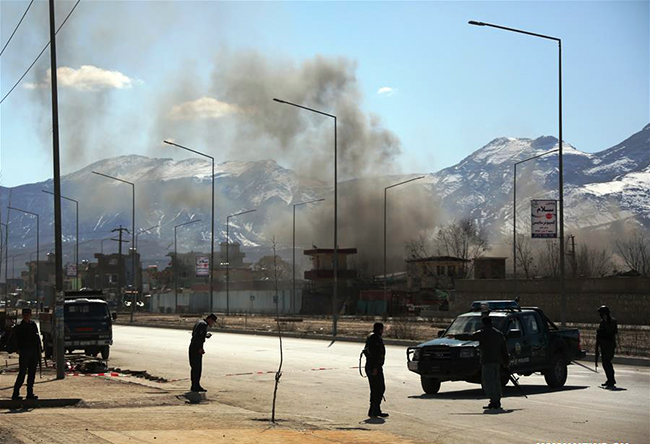The flagrant violation of human rights and dignity is a stain on the collective conscience. Streams of blood have been shed and unmitigated war and violence led to large casualties around the globe. Scores of men, women and children were killed on the grounds of their caste, color and creed. The individuals’ freedoms were curtailed to a great extent.
Radical ideologies and lack of religious tolerance played highly destructive role in recent years. Warring factions sought to impose their warped mind on people with the barrel of gun. Their parochial mindset and hard-line ideology engendered terrorism and escalated militancy in the region. Worst of all, the declaration of caliphate under Abu Bakr al-Baghdadi, on June 2014, deteriorated the regional instability and left ethnic minority groups at the mercy of greater peril. Militant fighters, mainly the self-proclaimed Islamic State of Iraq and the Levant (ISIL) group, pay no heed to humanitarian law and target combatants and non-combatants alike without an iota of mercy. Their atrocity and cruel practices are highly outrageous.
No wonder, terrorism, which blackmails the entire world, is a serious challenge around the human societies. Despite being combated strongly, terrorist networks have mushroomed and their venom is spew forth nationwide. For instance, the bloody war in Syria and escalated violence in Iraq, Afghanistan and Pakistan, which inflicted indescribable fatalities upon individuals, reveal the fact that militancy continues unabated. To put it succinctly, the pain and suffering of human societies never come to an end and there is a vacuum for the true spirit of democracy.
Democratic discourse and national and international conferences about human rights and dignity in general and the Universal Declaration of Human Rights (UDHR) in particular could not alleviate the tragedy and anguish of mankind. The UDHR has figured out the root causes of human sufferings as it states, “disregard and contempt for human rights have resulted in barbarous acts” and suggests the panacea for the bleeding wound of human societies as, “recognition of the inherent dignity and of the equal and inalienable rights of all members of the human family is the foundation of freedom, justice and peace in the world”.
Men are born free with a set of natural and inviolable rights and dignity. Humiliating men’s natural rights has resulted in deadly wars. Ethnocentrism and racial superiority have put the rights and liberty of ethnic minority groups, including women and children, at stake. Lack of religious tolerance triggered violence and bloodshed around the globe. Currently, terrorist networks excommunicate people and target them on the aforementioned grounds.
“Without a commitment to fundamental human rights, to the dignity and worth of the human person and to the equal rights of men and women and of nations large and small, our world will become chaos, misery and warfare,” the UN’s human rights chief Zeid al Hussein is cited as saying. “Of all the great post-war achievements, it is this assertion of the universality of rights in human rights law that may be the most noteworthy.”
Afghanistan is believed to bear the brunt of terrorism and soldiers and civilians’ fatalities increased to a great extent in recent years. Warring factions, especially the Taliban and ISIL fighters, spill the blood of nation. Instability and political turbulence never stop. Life has turned extremely cheap as a result of the insurgency which roots in radical ideology. In a nutshell, there are three main reasons behind the flagrant violation of human rights: lack of religious tolerance, ethnocentrism and radical ideology practiced by the militants.
To mitigate the challenges and seek to protect the rights and liberty of mankind around the globe, it is believed that religious approach to the issue will be counterproductive. So, a secular view such as respecting one’s rights for the sheer cause of being human, regardless of their racial and religious backgrounds, will alleviate the problem. With such an attitude, one will tolerate others the way they are. The UDHR also suggests a secular solution for the protection of men’s rights.
Secondly, terrorism is the most challenging issue and a major obstacle before the free exercise of one’s rights. Afghan government has constantly called warring parties to come to negotiating table and stop violence and bloodshed. However, this strategy backfired and the Taliban outfits intensified their attacks. They played a foul game, mainly with killing the former head of Afghan High Peace Council (HPC) Professor Burhanuddin Rabbani. This political game was proved abortive and the Taliban kept on targeting Afghan nation. So, one will conclude that since warring parties underestimate negotiation, it will not come to fruition.
The world will have to demolish the hubs of terrorism and terrorist groups, including those seminaries which have changed into hotbed of radical mindsets. That is to say, militant fighters must be shot on the head and all factors that pave the ground for radicalism are to be combated. It seems that the deep-seated ideology of militant groups will not be ended unless those ideologues are killed.
On the other hand, human societies must nurture the spirit of brotherhood and strengthen the bases of democracy. Establishing democratic administrations and giving participatory role to the public will decrease war and violence and enable individuals to exercise their rights freely.

